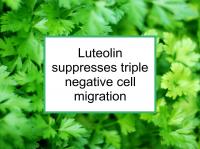Luteolin is a flavone, a subclass of flavonoids, which are pigments found primarily in fruits and vegetables. Luteolin has been shown to contribute to breast cancer cell death in several studies. For example, luteolin was found to reduce breast cancer cell viability in a dose-dependent and time-dependent manner in one study.
Luteolin also markedly inhibited formation of lung metastases in an animal model of breast cancer. Now a new study has reported that luteolin suppresses the migration (movement to a new location) of triple negative (ER-/PR-/HER2-) breast cancer cells. Migration of tumor cells is part of the metastatic cascade which facilitates the spread of cancer (migration is followed by invasion, metastatic colony formation and tumor growth).
Anti-breast cancer effects of luteolin
Numerous studies have reported that luteolin induces programmed cell death (apoptosis) in various types of cancer cells, including breast cancer. Luteolin has also been shown to inhibit angiogenesis (new blood vessel formation) and aromatase activity (in which androgens are converted into estrogens) of breast cancer cells in the laboratory. Italian population studies have reported that high dietary intake of flavones such as luteolin is associated with lower risk of breast cancer.
In addition, luteolin has been shown to induce apoptosis and reduce proliferation in multidrug resistant hormone receptor positive (ER+/PR+) breast cancer cells. In fact, luteolin has been shown increase the anti-cancer effects of the chemotherapy drugs doxorubicin and paclitaxel. Luteolin also can sensitize tamoxifen resistant breast cancer cells to tamoxifen, thereby improving its treatment effects.
Dietary sources of luteolin
Luteolin, which is a yellow pigment, is found most abundantly in the following foods:
- Celery seed & Chinese celery
- Mexican oregano (Lippia graveolens), dried
- Radicchio
- Thyme
- Artichokes
- Celery
- Hot peppers, especially green varieties
- Mint
- Parsley, especially dried
Luteolin-rich foods are a better choice for breast cancer patients and survivors than luteolin supplements. Safe and effective levels of concentrated luteolin have not been established. Luteolin is a phytoestrogen, which means that it has the potential to have both breast cancer promoting and inhibiting effects, depending on dosage and other factors. One study has suggested that luteolin could promote endometrial cancer (already a possible side effect of tamoxifen).
Latest research finds luteolin suppresses TN cell migration
The study referenced above was designed to investigate luteolin's potential role in inhibiting triple negative breast cancer progression. Epithelial to mesenchymal transition (EMT) enables an epithelial cell to acquire enhanced migratory capacity and invasiveness, as well as increased resistance to apoptosis. EMT has been shown to play pivotal role in the progression of triple negative breast cancer, including inducing cancer stem cell properties and resistance to chemotherapy, as well as promoting metastasis and breast cancer recurrence. Yes-Associated Protein (YAP) and Transcriptional Co-activator with PDZ-binding Motif (TAZ) are both important drivers of cancer progression and metastasis. Abnormally activated YAP/TAZ can bring about EMT in triple negative breast cancer. The authors are in the process of identifying potential YAP/TAZ inhibitors among naturally-derivative molecules.
In the current study, luteolin was shown to cause YAP/TAZ degradation in triple negative breast cancer cells, thereby significantly inhibiting YAP/TAZ activity. It was also demonstrated that luteolin treatment resulted in a decrease of mesenchymal markers and an increase of epithelial markers in both triple negative and TAZ-induced mesenchymal cells. The authors also showed that luteolin treatment consistently inhibited triple negative breast cancer cell migration. Furthermore, luteolin reduced tumor growth in a mouse model of triple negative breast cancer. The authors conclude that luteolin appears to be an effective YAP/TAZ inhibitor, with the potential for development as a new treatment of triple negative breast cancer.
Please see the luteolin tag and our article on foods to eat and avoid for triple negative breast cancer for more information.
